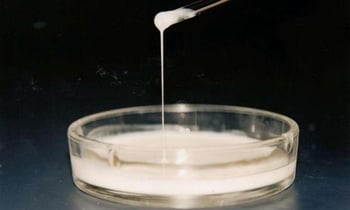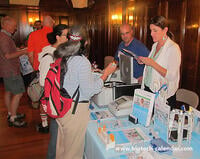 Microbiologists at Oregon State University have discovered and are licensing a new type of natural polymer dairy or food thickener called Ropy 352.
Microbiologists at Oregon State University have discovered and are licensing a new type of natural polymer dairy or food thickener called Ropy 352.
According to a university press release, development of Ropy 352 began in the early 1990’s, and now it has begun to go into commercial use in a $120 billion annual probiotic food industry.
In contrast to currently used dairy thickening agents, such as xanthum gum, the new polymer is derived from a non-disease causing bacterium. This means that the substance could potentially add probiotic characteristics to certain products such as milk, yogurt, soft cheeses, and a variety of fermented foods, which promotes good bacteria and optimum digestive health.
Xanthum gum, on the other hand, is generally recognized as safe by the FDA, but comes from a plant pathogen that is thought to be the cause of digestive distress and is pyrogenic, or fever-inducing.
 “This is one of many naturally occurring, non-disease-causing bacterial strains my research program isolated and studied for years,” said Janine Trempy, an OSU microbiologist. “We discovered that this bacterium had a brand-new, never-before reported grouping of genes that code for a unique polymer that naturally thickens milk. In basic research, we’ve also broadened our understanding of how and why non-disease-causing bacteria produce polymers.”
“This is one of many naturally occurring, non-disease-causing bacterial strains my research program isolated and studied for years,” said Janine Trempy, an OSU microbiologist. “We discovered that this bacterium had a brand-new, never-before reported grouping of genes that code for a unique polymer that naturally thickens milk. In basic research, we’ve also broadened our understanding of how and why non-disease-causing bacteria produce polymers.”
So far, the team has found that Ropy 352 has the ability to thicken a variety of milk products, including, whole milk, non-fat milk, lactose-free milk, coconut milk, and rice milk.
“There are actually very few new, non-disease-causing bacterial strains that produce unique polymers with characteristics desirable and safe for food products,” Trempy said. “In the case of a dairy thickener, for instance, a bacterium such as Ropy 352 ferments the sugar in the milk and produces a substance that changes the milk’s properties.”
In addition to applications as a dairy and food thickening agent, microbial polymers are used for food and chemical production, detergents, cosmetics, paints, pesticides, fertilizers, film formers, lubricants, explosives, pharmaceutical production and waste treatment. (Images Source: Oregonstate.edu)
This study is just one example of the important contributions to science made by researchers at OSU every year. For this reason, scientists at OSU are well funded for their contributions to science, and are participants in a major marketplace for life science research.
For example:
- After Oregon Health and Science University, OSU has generated more research funding dollars than any of the state’s other universities, according to a 2012 analysis by EcoNorthwest. Every dollar invested in research at OSU returns between $1.20-$1.67 in benefits to society.
- Both OSU and the UO made the Carnegie Foundation’s Tier 1 list for very high research activity and community engagement—out of 40 public universities ranked nationwide.
- OSU’s 2013 Life Science R & D Expenditures = $120,571,000
- Oregon State University's Linus Pauling Institute received a five-year, $5.8 million grant from the National Institutes of Health to research aging, cardiovascular disease, and neurodegenerative problems such as amyotrophic lateral sclerosis.
- Oregon State University recently received a $5 million gift from the Moore family to establish the Moore Family Center for Whole Grain Foods, Nutrition, and Preventive Health in OSU's College of Health and Human Sciences.

Lab supply vendors and life science researchers interested in meeting at Oregon State University for a leading biotech event can participate in the 10th Annual BioResearch Product Faire™ Event at Oregon State University in Corvallis, Oregon on Wednesday, September 2, 2015.
This event is a great opportunity to network and learn about the latest biotech and lab supplies, at no cost to researchers. For more information about participating in this premier life science event, click below:



